
Women and children are disproportionately affected by natural disaster and war - pregnant women face dangerous deliveries and, in unprotected refugee settlements, rape, trafficking and gender-based violence increase. IPPF delivers essential lifesaving services for women, men and children in times of crisis.
Articles by Emergencies

Two earthquakes and four hurricanes: your help is needed NOW
Donate now to support our humanitarian response to Hurricanes Maria, Irma, Jose, and Katia and the earthquakes in Mexico. Four hurricanes and two earthquakes have hit America and the Carribean in the last weeks. The situation is unprecedented and the International Planned Parenthood Federation has activated its humanitarian response network. We’re assessing damage, working on deploying personnel, and making sure our clinics are ready to help in any way possible. Donate now to support our emergency relief efforts. Your gift will be used where it is needed the most. In the past 48 hours three hurricanes and an earthquake have hit the Western Hemisphere region. The situation is unprecedented and the International Planned Parenthood Federation has activated its Humanitarian Assistance Emergency Protocol. We’re assessing damage, working on deploying personnel, and making sure our clinics are ready to help in any way possible. Donate now to support our effort image credits: US Department of Defense
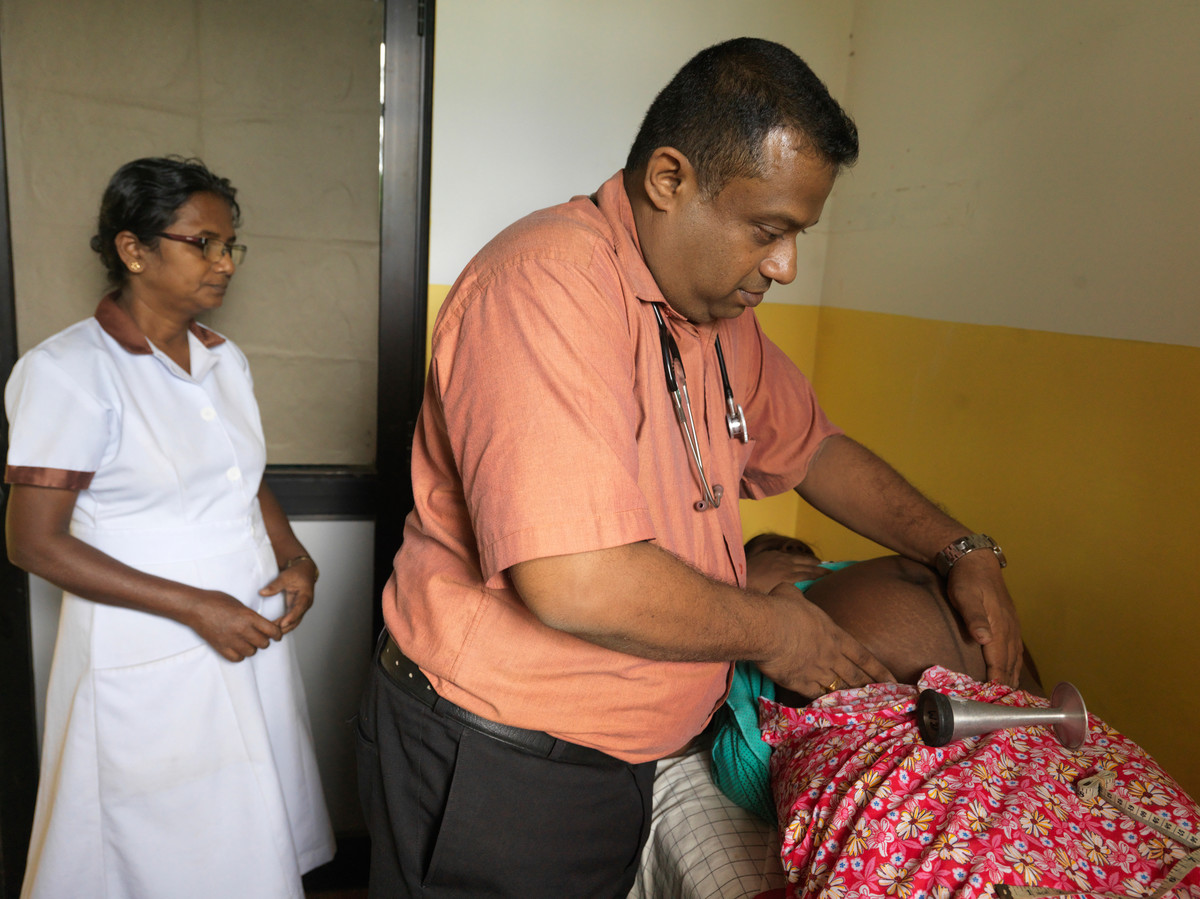
"One pregnant woman was delivering at this time, so she had to go on a boat to dry land"
Incessant rains across Sri Lanka during May 2017 affected over half a million people in seven districts. Most affected was the Ratnapura district where over 20,000 people faced flash floods, and where 46 deaths were reported. IPPF Humanitarian, in partnership with FPA Sri Lanka, responded to this catastrophe through the distribution of over 700 dignity kits in Ratnapura Dr. Rohan Jayasuriya and midwife Chaturika Lakmale were on the ground during and after the floods providing family planning services and contraception to women affected by the disaster. “When the floods came our clinic was located on higher ground, so it wasn’t damaged. The floods finished on the 31 May 2017, and we reopened one day later on the 1 June 2017. After the floods, we arranged several special clinics just for family planning, and distributed condoms and emergency supplies of the pill to camps in case women missed their regular form of contraception like injectables, implants or IUDs. In Sri Lanka, approximately 67% of couples use family planning, 26% of which prefer IUDs” We offered condoms and emergency supply of the pill. We told women to keep one packet of the pill in their handbag, and one in their home, should they ever have to run quickly in an emergency. One pregnant woman was delivering at this time, so she had to go on a boat to dry land, and then onwards in a vehicle to the hospital. Once we reopened the clinic, two of our own midwives were unable to attend work as the floods had affected them, but I was here. It was so busy.” Stories Read more stories from Sri Lanka
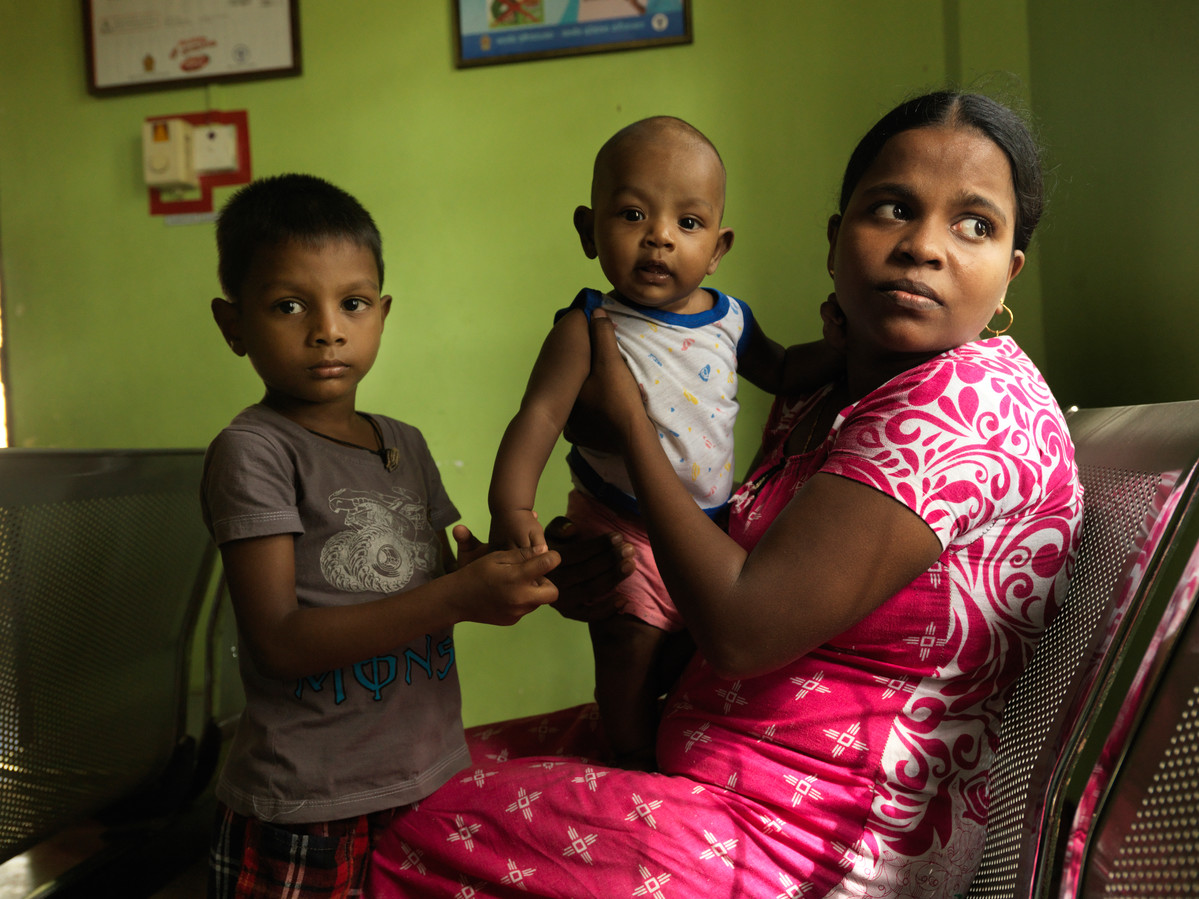
"I looked up and saw trees falling near my neighbour’s house up the hill. My neighbours died"
Incessant rains across Sri Lanka during May 2017 affected over half a million people in seven districts. Most affected was the Ratnapura district where over 20,000 people faced flash floods. “When the flood came, my husband was feeding my eldest child and the baby was asleep in the bed. I was outside of the house. My mother was brushing her teeth outside the back of the house. I looked up and saw trees falling near my neighbour’s house up the hill. My neighbours died. I couldn’t take any possessions – I just had to run for my life. My husband took my younger child. They were all screaming. Since then, I have had my children checked here in the Ministry of Health clinic; their weight, height and nutrition. We had two houses on the one block of land, but we will only get compensation for one house. We can’t live in a tent with a baby so are currently renting a house with our own money, but for a while my mother and father slept in this clinic.” Stories Read more stories from Sri Lanka
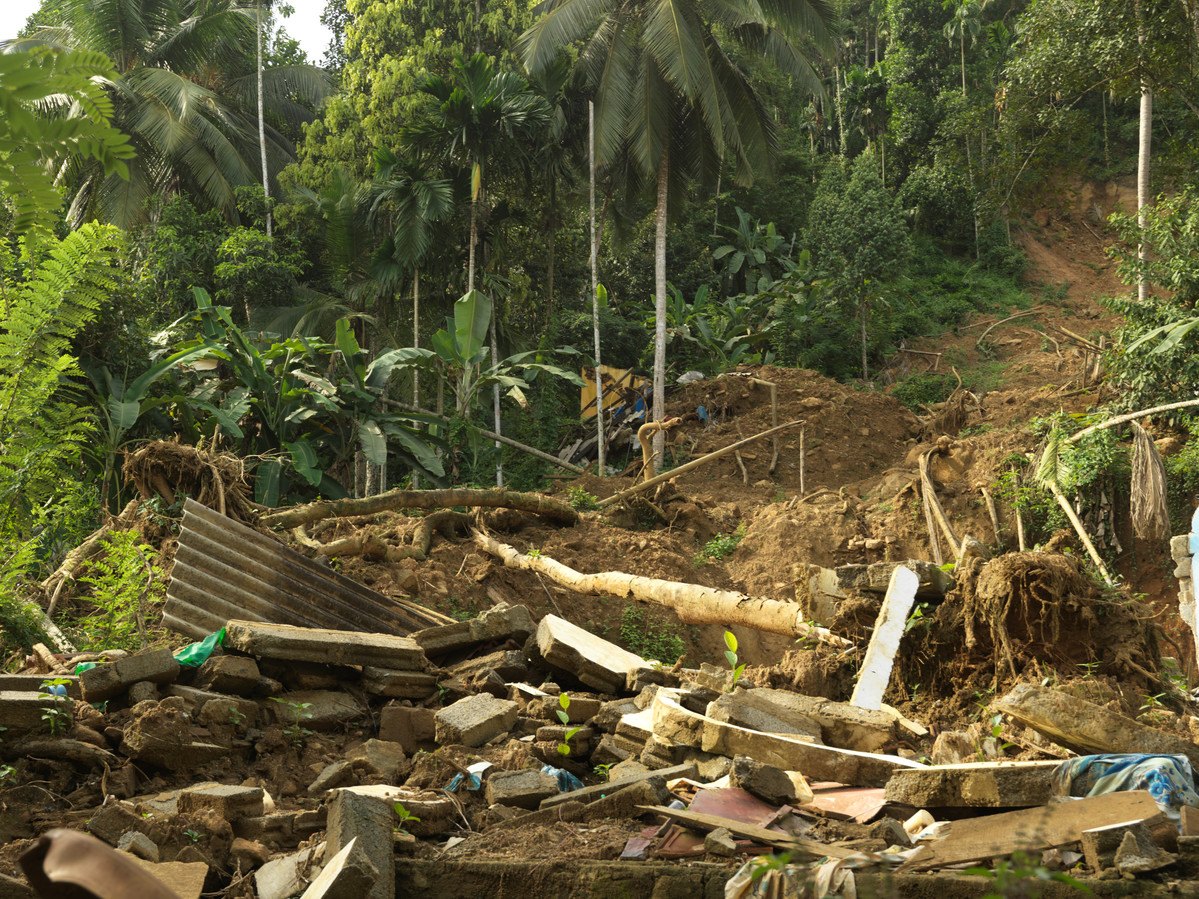
Flash floods in Sri Lanka affected over half a million people
Incessant monsoonal rains during the last week of May 2017 triggered floods and landslides across Sri Lanka, affecting over half a million people and according to national authorities, killing over 200 people. Natural disasters like this disproportionately affect women and girls. They experience sexual violence, unwanted pregnancies and are vulnerable to sexually transmitted infections. Healthcare facilities are often compromised, so pregnant women miss out on essential prenatal care. The Family Planning Association of Sri Lanka immediately responded to this catastrophe through the distribution of dignity kits and holding awareness sessions on gender based violence. To provide further care and support, a series of mobile medical clinics were established. Priyanka, 32, is eight months pregnant when we meet her at one of the many mobile health clinics established after the floods. “I was five months pregnant when the floods came. I had to go to my friend’s house up the mountain for safety with my 2.5-year-old daughter,” she said. Standing outside her house later, a stone’s throw from the river banks, you can imagine how terrifying it would have been to watch the flood waters rise to your house. Priyanka and her family were unharmed, but her husband’s business was destroyed, affecting their livelihoods. “When the floods came into our house, all my husband’s machines that he used for his dahl business were destroyed by the water. We are having them repaired now. All the people from our village came to clean up my house. The doctor came to my area and checked all the pregnant mothers. This is my second time now visiting this health clinic.” The clinic, located in the Nagoda District, reopened mere days after the floods, Midwife Chaturika Lakmale tells us proudly, despite some of the midwives being unable to return to work themselves due to the floods. ‘We offered condoms and emergency supplies of the pill’, she tells us. FPA-SL are one of the most expansive and well-known NGOs in Sri Lanka that offer family planning, sexual and reproductive healthcare. Because of this, in times of emergency, they are well positioned to understand the local context. ‘We told women to keep one packet of the contraceptive pill in their handbag, and one in their home, should they ever have to run quickly in an emergency’, said Chaturika. Staff in our mobile health clinics, like Dr Rohan Jayasuriya, are strongly committed to sexual and reproductive rights in Sri Lanka. ‘Abortion is illegal in Sri Lanka, except if the mother’s life is at risk. It costs 30,000 – 40,000 Sri Lankan rupees for a backyard abortion. If complications arise, they have to go to hospital, but then a legal case might be filed against them. That’s why family planning - in stable settings but also emergencies - is so important.’ Stories Read more stories from Nepal
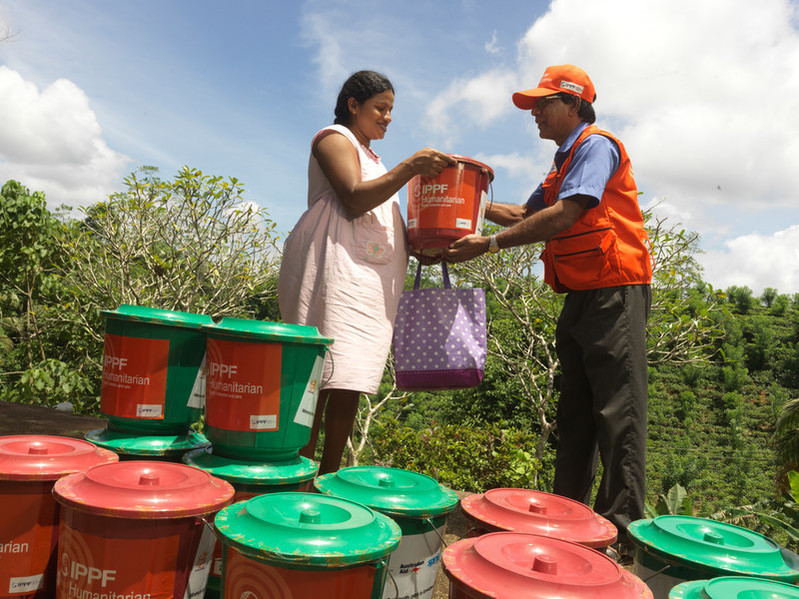
Over 1,000 dignity kits distributed after flash floods in Sri Lanka
Incessant rains across Sri Lanka during May 2017 affected over half a million people in seven districts. Most affected was the Ratnapura district where over 20,000 people faced flash floods, and where 46 deaths were reported. IPPF Humanitarian, in partnership with FPA Sri Lanka, responded to this catastrophe through the distribution of over 1,000 dignity kits in Ratnapura. Stories Read more stories about our humanitarian work in Sri Lanka during the floods
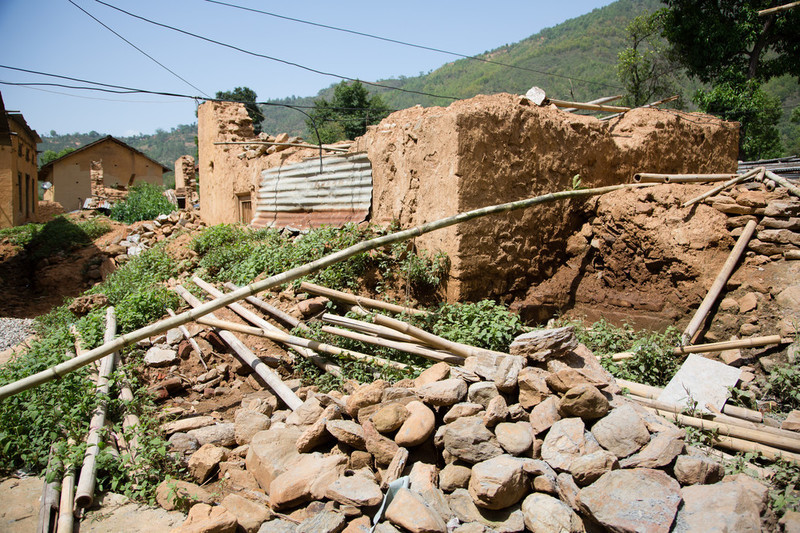
Continuing contraception services and women's health in the wake of disaster, Nepal
Just before midday on Saturday 25 April 2015, a 7.8 magnitude earthquake shook Nepal, causing massive devastation and loss of life. It was the worst natural disaster to strike the country for 80 years – and one the country is still recovering from. Three million people were displaced, 22,000 were injured and 9,000 people lost their lives. According to UNDP, 800,000 homes, were damaged or destroyed. A Nepalese government assessment in 2015 estimated the cost of damage, loss and reconstruction to be $14.6 billion – around three quarters of the country’s entire gross domestic product for 2015 The stories of survivors are harrowing. Twenty-two-year-old Anjana Suwal spent five hours trapped in the rubble of her family’s house. “I was thinking to myself: this is going to be the end of my life: I won’t survive,” she says. “I could hear sounds from outside and I began shouting and shouting, but no one heard me. My throat began to get sore and eventually I couldn’t make any more sounds: I felt so hopeless.” Others speak of their desperate searches to find their children, alongside bittersweet gratitude that the earthquake had occurred on a Saturday rather than an ordinary school day, when the loss of life could have been far higher. The effect on healthcare and family planning was severe. Clinics and hospitals were destroyed and those that survived quickly became overcrowded and had turn away hundreds of injured patients. Millions of people were forced from their homes into tents, often many miles from their usual clinics and family planning centres. Women, girls and orphans were particularly vulnerable: living in tents exposed them to sexual violence, while menstrual hygiene and basic cleanliness in the searing April heat became a struggle. “There was always the fear of getting abused,” says FPAN volunteer Rita Tukanbanjar, who spent 20 days living in a tent after the earthquake. Hitting the ground running When the earthquake struck, FPAN lost no time in taking action. The first job was to do a needs assessment. Then, within 48 hours, FPAN had set up mobile health camps across the country, providing family planning services as well as general health check ups. The team offered essential items like oral rehydration, medicines, food and water. They also distributed contraception and dignity kits, provided women with antenatal checks, and set up blood-testing labs and psycho-social counselling services. Women- and children-friendly spaces provided a haven for the most vulnerable to retreat to in safety. The organisation also organised classes on menstrual hygiene and taught women and girls how to make sanitary pads from scratch. “During that time, girls were facing a lot of problems maintaining their menstrual hygiene,” explains FPAN volunteer Rita Tukanbanjar. “All the shops and services for menstrual hygiene were closed.” FPAN’s classes provided a vital service to women and girls, as well as valuable knowledge for life after the emergency response. Up in the mountains of Rasuwa, close to the border with Tibet, FPAN ran a three-month mobile health camp, providing basic healthcare and family planning services. Equipped for future disasters FPAN, like Nepal, still has visible earthquake damage. “Most of our service delivery points in the Kathmandu Valley are still damaged,” says Sharad Kumar Argal. But amid the tragedy and loss of the earthquake, the impressive and efficient emergency response it galvanised has left FPAN in a much stronger position, should another natural disaster strike Nepal. It also mobilised a huge number of young people to help: many of these volunteers are still working for FPAN, delivering vital sexuality education and community home-based care services.
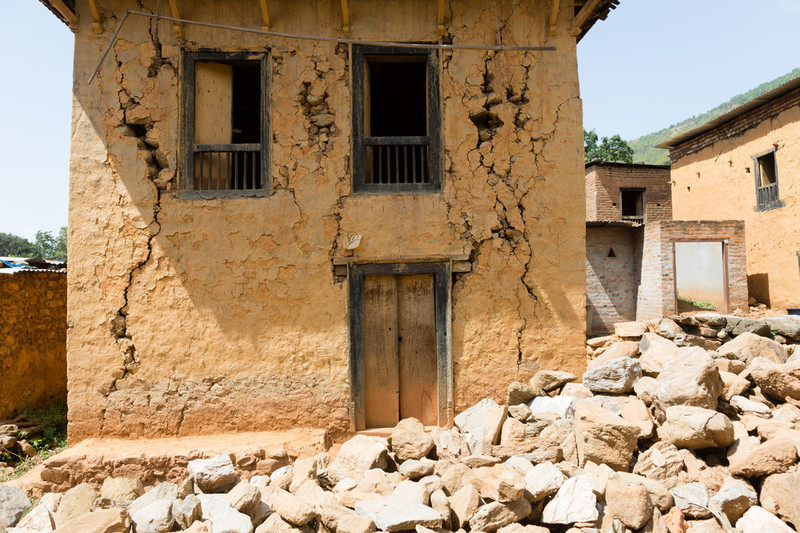
Mobile camps provide emergency services for those unable to return home
Muna Shrestha lives with her husband and two children in Bakultar, a rambling village of mud houses, tea shacks and vegetable, miles off a main road, at the end of a long dirt track in Kavre district, a few hours west of Kathmandu. On the morning of Saturday 25 April 2015, when the earthquake struck, she and her family were cleaning the cowshed. “It was so scary,” she says. “The children were not at home: we were so worried about the children and went looking for them. They were also looking for us.” The days after the earthquake were chaotic. “The schools were closed for a month,” Muna says. “And because all our clothes and possessions were in the ruins, it was difficult to get our things.” Their children were deeply traumatised. “They became scared, and, because of this fear, they wouldn’t eat and they suffered from nausea,” Muna says. As she speaks, she gestures around the family’s old home, at the deep fissures in the mud walls. “This home is cracked by the earthquake. Our family also have another house but that was completely destroyed.” Like many families across Nepal, the Shresthas have been unable to afford to rebuild and make their old home structurally safe. It is a story now ubiquitous across Nepal: a family losing their house and possessions, scarred by trauma, and unable to return home.
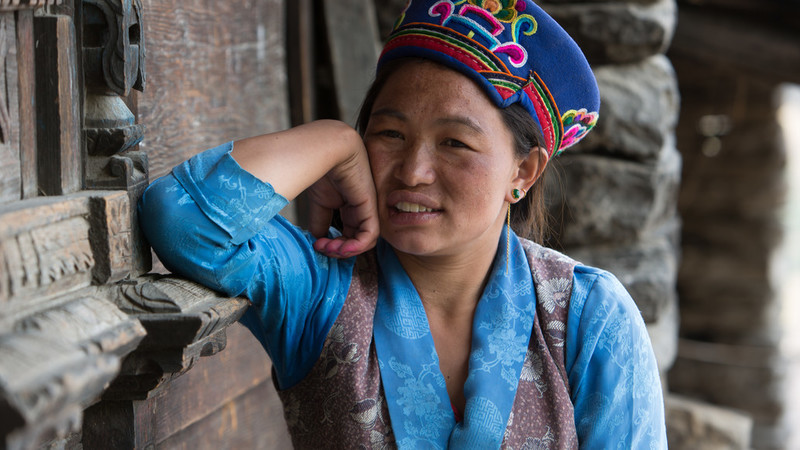
Female volunteers take the lead to deliver life critical health advice after the earthquake
“After the earthquake, there were so many problems. So many homes were destroyed. People are still living in temporary homes because they’re unable to rebuild their homes.” Pasang Tamang lives in Gatlang, high up in the mountains of northern Nepal, 15 kilometres from the Tibetan border. It is a sublimely beautiful village of traditional three-storied houses and Buddhist shrines resting on the slopes of a mountain and thronged by lush potato fields. The 2000 or so people living here are ethnic Tamang, a people of strong cultural traditions, who live across across Nepal but particularly in the lands bordering Tibet. The earthquake of 25 April had a devastating impact on Gatlang. Most of the traditional houses in the heart of the village were damaged or destroyed, and people were forced to move into small shacks of corrugated iron and plastic, where many still live. “Seven people died and three were injured and then later died,” says Pasang. These numbers might seems small compared to some casualty numbers in Nepal, but in a tightknit village like Gatlang, the impact was felt keenly. Hundreds of people were forced into tents. “People suffered badly from the cold,” Pasang says. “Some people caught pneumonia.” At 2240 metres above sea level, nighttime temperatures in Gatlang can plunge. Pregnant women fared particularly badly: “They were unable to access nutritious food or find a warm place. They really suffered.” Pasang herself was badly injured. “During the earthquake, I was asleep in the house because I was ill,” she says. “When I felt the earthquake, I ran out of the house and while I was running I got injured, and my mouth was damaged.” Help was at hand . “After the earthquake, there were so many organisations that came to help, including FPAN,” Pasang says. As well as setting up health camps and providing a range of health care, “they provided family planning devices to people who were in need.” Hundreds of families still live in the corrugated iron and plastic sheds that were erected as a replacement for tents. The government has been slow to distribute funds, and the villagers say that any money they have received falls far short of the cost of rebuilding their old stone homes. Pasang’s house stands empty. “We will not be able to return home because the house is cracked and if there was another earthquake, it would be completely destroyed,” she says. Since the earthquake, she has begun working as a volunteer for FPAN. Her role involves travelling around villages in the area, raising awareness about different contraceptive methods and family planning. Volunteers like Pasang perform a crucial function in a region where literacy levels and a strongly patriarchal culture mean that women marry young and have to get consent from their husbands before using contraception. In this remote community, direct contact with a volunteer who can offer advice and guidance orally, and talk to women about their broader health needs, is absolutely vital.
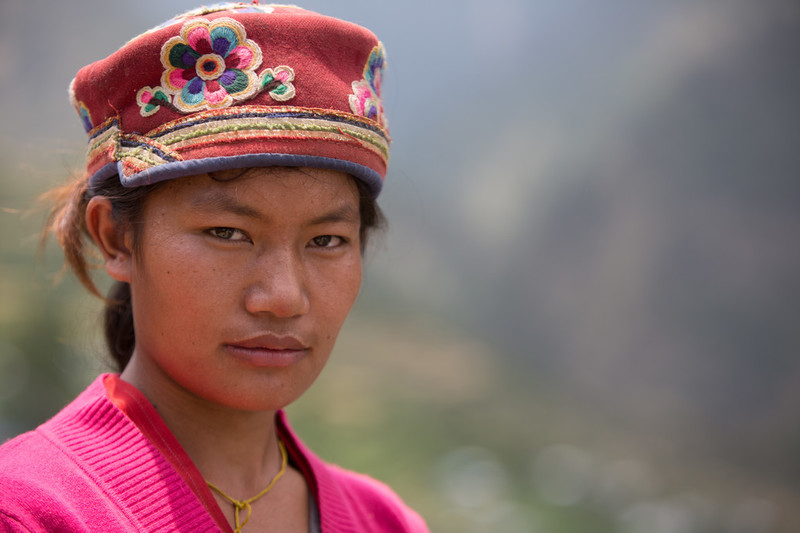
Reproductive health for Nepalese female farmers after the earthquake
Two years after the earthquake that struck Nepal in April 2015, the village of Gatlang in the country’s mountainous north still lies in partial ruin. The houses here are built from enormous slabs of local stone, carved windows and doors, and roofs of stacked wooden planks. They face east towards the rising sun, their facades bedecked in intricate wooden carvings patterns linked to the ancient Buddhist culture of the Tamang people. Today, most of these houses lie in ruin, emptying the heart of the village of people, with most moving to temporary shacks on Gatlang’s fringes. Kopila Tamang is a 24-year-old farmer and mother to two young boys. Her husband, Nakul, works as a lorry driver and is often away. “When the earthquake struck, I was working in the fields,” she says. “If I had been at home, I would have died.” Kopila’s house – or what remains of it – lies at the centre of old Gatlang, on a street of traditional houses that have either entirely collapsed or are uninhabitable due to cracks and structural damage. Piles of stone and wooden cross beams are strewn in what was once a thriving village street. Like many families here, Kopila and her husband and boys have moved into a small shack built from corrugated iron and plastic. This was meant to be a temporary solution, but two years later, they are still living in it, unable to afford the enormous cost of rebuilding their old home. “It needs lots of money,” she says. “I don’t know when we will have the money to build this home again.” FPAN provided emergency health support to families like Kopila’s in the weeks and months after the earthquake. Mobile health camps offered medicines, health check ups, dignity kits, family planning, antenatal checks and other vital services. These days, Kopila gets regular advice from Pasang Tamang, the FPAN reproductive health female volunteer in the village. Kopila had suffered after the birth of her last child. “I didn’t menstruate for eight months, and then after that I started using the [contraceptive] injection,” she says. “But there were some side effects: I started menstruating twice a month.” She then went to a mobile health camp run by FPAN and started using the intrauterine coil. “After that, my menstruation went back to normal,” she says. In a village scarred by the earthquake, access to family planning has brought some much needed stability and relief to Kopila and her small family. “FPAN provide different services and knowledge: I have come to know that having more children can bring suffering, because it’s not enough to just feed children, they must be educated too” she says. “A small family is a happy family.”
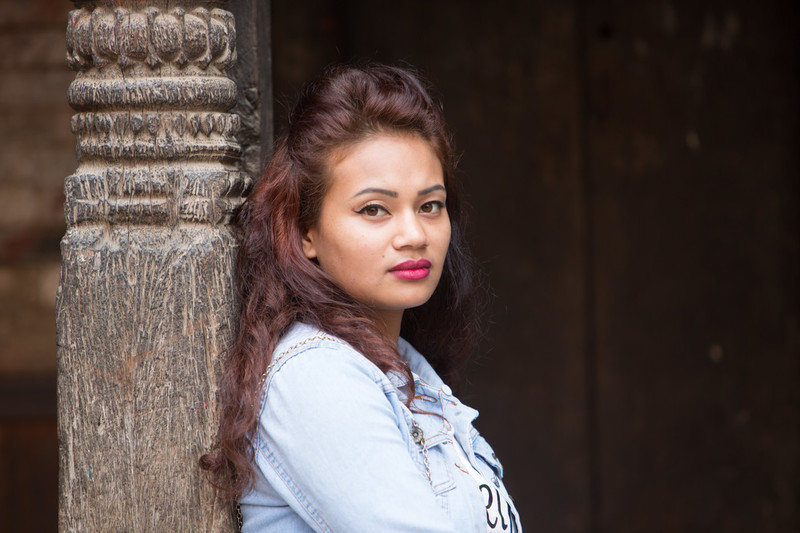
A rescued student devotes her time to rebuilding her community
For 22-year-old student Anjal Auwal, April 25 began as an ordinary day. She had been up late the night, preparing for an exam. Tired after revising, she woke up late and went into the kitchen to eat. It was then that the earthquake struck. “When it struck and I saw the walls shaking and falling down, I collapsed,” Anjal says. “I knew nothing after that. It was just like a dream.” Anjal, a business student from Bhaktapur, spent five hours trapped in the rubble of her family’s house. They lived in one of the traditional mud and wooden houses that line the streets of this ancient temple city. Some of the mud walls and wooden support structure fell on Anjal’s legs and arms, trapping her. “I was thinking to myself: this is going to be the end of my life: I won’t survive,” she says. “I could hear sounds from outside and I began shouting and shouting, but no one heard me. My throat began to get sore and eventually I couldn’t make any more sounds. I felt so hopeless.” Hours later, Anjal heard her uncle’s voice from somewhere beyond the rubble that surrounded her. “I thought this is my chance, and I shouted again in the hope my uncle might hear me.” Eventually, five hours after being trapped, Anjal was pulled from the rubble, injured but alive. “My left side was not working, so my family took me to hospital,” she says. “But the hospital rejected me because they had such limited services. Eventually we found another hospital to care for me.” Anjal’s injuries were extensive. It took six months of medication, rest and rehabilitation for her hand and leg to recover. She also suffered digestion problems: whenever she ate, she would vomit, and the doctors became alarmed that her body was getting little nutrition. Two years later, she has more or less recovered. “I still have a few problems with digestion, I have scars from the wounds and I occasionally gets pain in my hands, but things have improved a lot,” she says. Her sickness and long rehabilitation meant her studies were interrupted, but eventually she managed to take the exam and passed. Having time off has given her time to reflect on what she wants to do with her life. She’s now planning to volunteer for FPAN, after hearing about it from friends at school. “I haven’t so far because of my health problems,” she says. “But now I’m eager to join and to learn about sexual health and family planning. I’ve realised it’s very important.”
Pagination
- Previous page
- Page 5
- Next page







